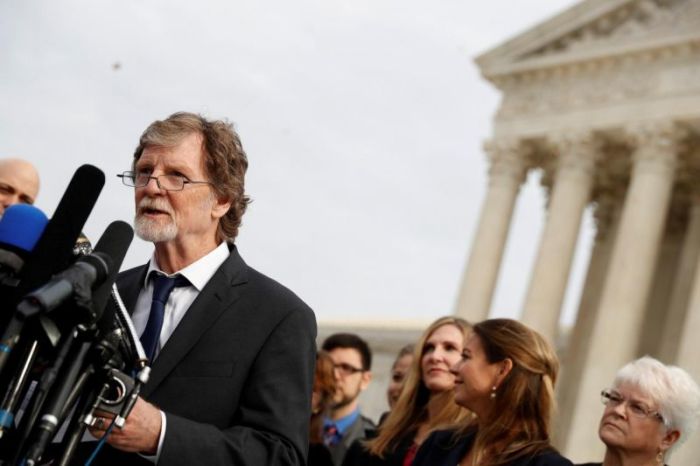Supreme Court Rules Christian Baker Jack Phillips Can Refuse to Make Gay Wedding Cakes

The United States Supreme Court ruled in favor of Colorado Christian baker Jack Phillips on Monday in overwhelming fashion, saying that the state government's hostility towards his refusal to make a same-sex wedding cake violated the U.S. Constitution.
In a 7-2 vote, the nation's high court ruled that the state of Colorado violated the Free Exercise Clause of the First Amendment when it penalized Phillips and his Masterpiece Cakeshop in Lakewood for violating a state discrimination law by refusing to bake a custom cake to celebrate the wedding of Dave Mullins and Charlie Craig.
"The laws and the Constitution can, and in some instances must, protect gay persons and gay couples in the exercise of their civil rights, but religious and philosophical objections to gay marriage are protected views and in some instances protected forms of expression," a summary of court's majority opinion states.
"While it is unexceptional that Colorado law can protect gay persons in acquiring products and services on the same terms and conditions as are offered to other members of the public, the law must be applied in a manner that is neutral toward religion."
The court reasoned that Phillips use of his artistic abilities to make a wedding cake carries a "significant First Amendment speech component and implicates his deep and sincere religious beliefs."
"His dilemma was understandable in 2012, which was before Colorado recognized the validity of gay marriages performed in the State and before this Court issued United States v. Windsor," the ruling explained. "Given the State's position at the time, there is some force to Phillips' argument that he was not unreasonable in deeming his decision lawful."
The court points out that Colorado law at the time gave the storekeepers "some latitude to decline to create specific messages they considered offensive."
"Indeed, while the instant enforcement proceedings were pending, the State Civil Rights Division concluded in at least three cases that a baker acted lawfully in declining to create cakes with decorations that demeaned gay persons or gay marriages," the court stated. "Phillips too was entitled to a neutral and respectful consideration of his claims in all the circumstances of the case."
The court criticized the Colorado Civil Rights Commission's clear bias against Phillips' Christian beliefs, which first ruled that Phillips violated that state discrimination law after the couple filed a complaint. The opinion states that the commission showed a "clear and impermissible hostility toward the sincere religious beliefs motivating his objection."
"At several points during its meeting, commissioners endorsed the view that religious beliefs cannot legitimately be carried into the public sphere or commercial domain, implying that religious beliefs and persons are less than fully welcome in Colorado's business community," the majority opinion written by Justice Anthony Kennedy states. "One commissioner suggested that Phillips can believe 'what he wants to believe,' but cannot act on his religious beliefs 'if he decides to do business in the state.'"
The opinion even stated that the "commissioner even went so far as to compare Phillips' invocation of his sincerely held religious beliefs to defenses of slavery and the Holocaust."
"This sentiment is inappropriate for a Commission charged with the solemn responsibility of fair and neutral enforcement of Colorado's antidiscrimination law — a law that protects discrimination on the basis of religion as well as sexual orientation," the opinion states.
The court also stated that more evidence of "hostility" towards Phillips was shown by the fact that he received "different treatment" than that of the bakers with objections to making cakes that were deemed to have "anti-gay" messages.
The two justices who dissented were Justices Ruth Bader Ginsburg and Sonia Sotomayor.
Alliance Defending Freedom attorney Kristen Waggoner, who defended Phillips in the case, said in a statement that "government hostility toward people of faith has no place in our society."
"The court was right to condemn that," she said. "Tolerance and respect for good-faith differences of opinion are essential in a society like ours. This decision makes clear that the government must respect Jack's beliefs about marriage."
Following the court's ruling, many Christian leaders took to social media to voice their support of the decision.
"We thank God for answered prayer!" Franklin Graham wrote on Twitter. "Today the Supreme Court has ruled in favor of Jack Phillips, the Colorado baker who refused to create a wedding cake for a same-sex marriage ceremony. This is a huge win for religious freedom!"
Russell Moore, president of the Southern Baptist Convention's Ethics and Religious Liberty Commission, also said that the ruling is a "win."
"What we don't need are governments forcing people to use their gifts to say things that go against their deepest-held convictions," Moore said in a video statement. "So this ruling is a win not only for those of us who are Christians who hold to a pro-marriage, pro-family viewpoint but also for all Americans for freedom of conscience and freedom of speech."
Despite the outcome, the American Civil Liberties Union, the law firm representing the couple, argued that the court's ruling was "based on concerns specific to the case."
"The Court did NOT rule that the Constitution gives a right to discriminate," the law group wrote on Twitter.
"As a nation, we've already rejected the idea that businesses open to the public have a license to discriminate against people because of who they are," another ACLU tweet reads.
Conservative blogger Matt Walsh made a similar argument.
"Do not call this 'a huge win for religious liberty.' It simply isn't," he wrote in a tweet. "That is an inaccurate and misleading statement. This is a huge win for Jack Phillips, specifically, but it does precisely nothing to help the general cause of religious liberty."
The Alliance Defending Freedom will hold a press call Monday afternoon to answer questions about the ruling. An update will follow.




























